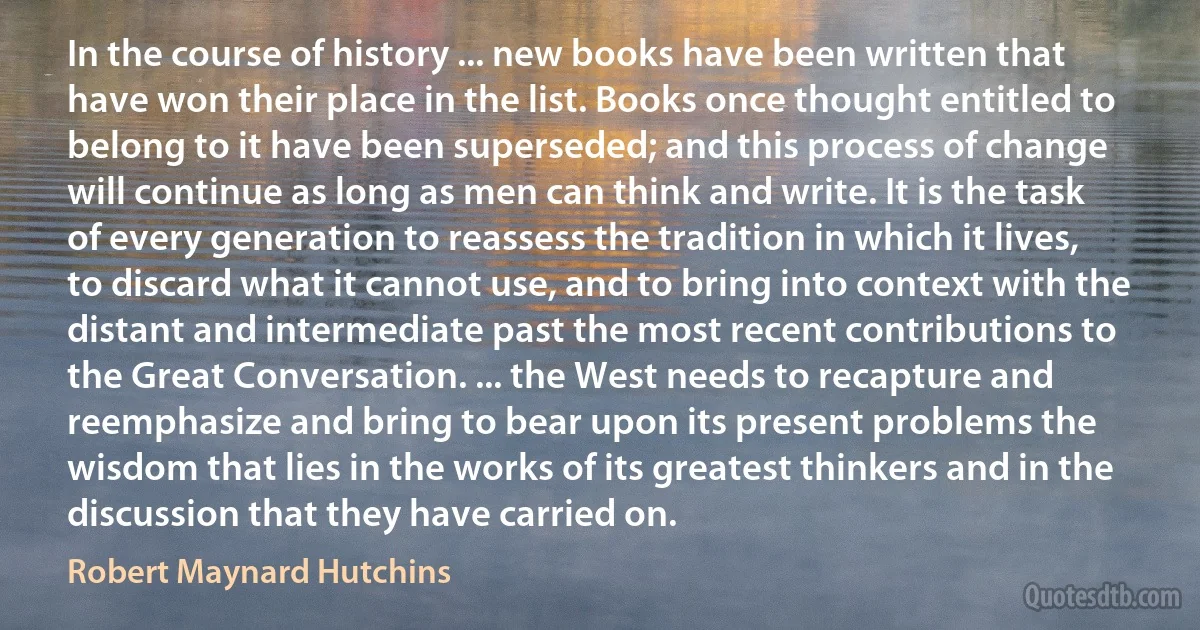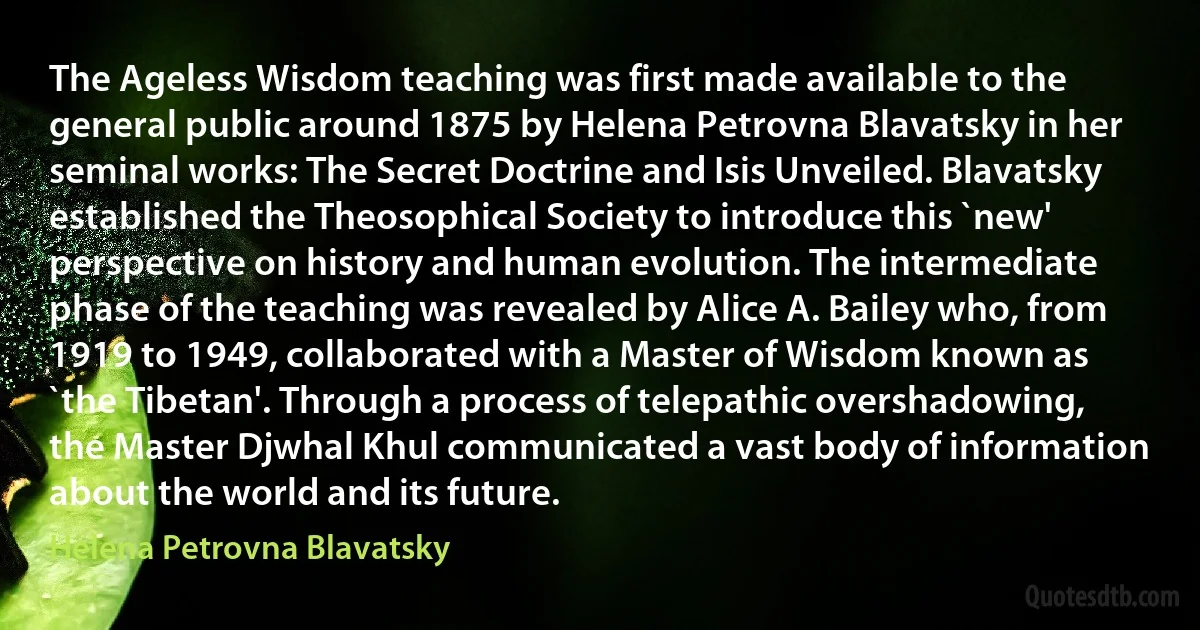Intermediate Quotes - page 4
Throughout the past several centuries, people have used the term race to describe groups of people in much the same way it was used in past centuries to describe groups of animals. People with ancestry from a particular region of tend to share certain inherited similar features, resembling their parents. However, the children of parents with substantially different ancestral backgrounds often have an appearance that is intermediate between that of their two parents, and in subsequent generations, the offspring may vary. In part because of the obvious similarities between animals and humans for how traits are inherited, and in part because of cultural, political, and religious traditions, notinos of racial purity and superiority have surged and ebbed yet persisted, crossing the boundaries of culture, geography, politics, and time. They are still with us today, and some of the most insidious actions based on notions of racial supremacy happened not long ago.

Daniel J. Fairbanks
The raising of the status of Darwinian theory to a self-evident axiom has had the consequence that the very real problems and objections with which Darwin so painfully laboured in the Origin have become entirely invisible. Crucial problems such as the absence of connecting links or the difficulty of envisaging intermediate forms are virtually never discussed and the creation of even the most complex of adaptations is put down to natural selection without a ripple of doubt.

Michael Denton
Those who live in a cold climate and in [northern] Europe are full of spirit, but wanting in intelligence and skill; and therefore they keep their freedom, but have no political organization, and are incapable of ruling over others. Whereas the natives of Asia are intelligent and inventive, but they are wanting in spirit, and therefore they are always in a state of subjection and slavery. But the Hellenic race, which is situated between them, is likewise intermediate in character, being high-spirited and also intelligent. Hence it continues free, and is the best governed of any nation, and, if it could be formed into one state, would be able to rule the world.

Aristotle
Nebulæ can be selected so that an insensible gradation shall take place from a coarse cluster like the Pleiades down to a milky nebulosity like that in Orion, every intermediate step being represented. This tends to confirm the hypothesis that all are composed of stars more or less remote.

William Herschel
If we focus our attention on the next twenty-five years we may say that development is likely to reach some point intermediate between the first bomb detonated over Hiroshima and processes which once initiated might put an end to all life on earth. Just what intermediate point will be reached within twenty-five years no one can tell.

Leó Szilárd
The Tibetan Master Djwhal Khul... between 1919 and 1949... dictated, by mental telepathy, a series of 19 books through Alice A. Bailey. (Bailey herself wrote five additional volumes.) These 19 very profound, and to my mind very practical, teachings are the intermediate phase of the teachings given out by the Masters for the new age of Aquarius now beginning. The Secret Doctrine was the preparatory phase of the teachings, given through Madame [Helena Petrovna ] Blavatsky, who lived and worked for some years with a group of Masters in the Himalayas. One of them was the Master Morya, her own Master, and another the Master Koot Hoomi, both very advanced Masters. These two Masters are deeply involved with humanity and, with the Master Jesus...

Helena Petrovna Blavatsky
The productions of the earth require long and difficult preparations, before they are rendered fit to supply the wants of men.
The productions which the earth supplies to satisfy the different wants of man, will not, for the most part, administer to those wants, in the state nature affords them; it is necessary they should undergo different operations, and be prepared by art. Wheat must be converted into flour, then into bread; hides must be dressed or tanned; wool and cotton must be spun; silk must be taken from the cod; hemp and flax must be soaked, peeled, spun, and wove into different textures; then cut and sewed together again to make garments, &c. If the same man who cultivates on his own land these different articles, and who raises them to supply his wants, was obliged to perform all the intermediate operations himself, it is certain he would succeed very badly.

Anne Robert Jacques Turgot
We wish to see... the typical attitude of the scientist who uses mathematics to understand the world around us. ...In the solution of a problem ...there are typically three phases. The first phase is entirely or almost entirely a matter of physics; the third, a matter of mathematics; and the intermediate phase, a transition from physics to mathematics. The first phase is the formulation of the physical hypothesis or conjecture; the second, its translation into equations; the third, the solution of the equations. Each phase calls for a different kind of work and demands a different attitude.

George Pólya
It was a moment of the kind that changes lives. At a press conference held by climate activists Extinction Rebellion last week, two of us journalists pressed the organisers on whether their aims were realistic. They have called, for example, for UK carbon emissions to be reduced to net zero by 2025. Wouldn't it be better, we asked, to pursue some intermediate aims? [...] Softer aims might be politically realistic, but they are physically unrealistic. Only shifts commensurate with the scale of our existential crises have any prospect of averting them. Hopeless realism, tinkering at the edges of the problem, got us into this mess. It will not get us out.

George Monbiot
In any case God's act was the union of Mind with Matter by the same act or will which created both. No intermediate cause or condition intervened; no secondary influence had anything whatever to do with the result. Time had nothing to do with it. Every individual that has existed or shall exist was created by the same instantaneous act, for all time. "When the question regards the universal agent who produces beings and time, we cannot consider him as acting now and before, according to the succession of time." God emanated time, force, matter, mind, as he might emanate gravitation, not as a part of his substance but as an energy of his will, and maintains them in their activity by the same act, not by a new one. Every individual is a part of the direct act, not a secondary outcome.

Henry Adams
In 1858 he was selected by [the British Association] to prepare a report upon the Theory of Numbers. It was prepared in five parts, extending over the years 1859-1865. It is neither a history nor a treatise, but something intermediate. The author analyzes with remarkable clearness and order the works of mathematicians for the preceding century upon the theory of congruences, and upon that of binary quadratic forms. He returns to the original sources, indicates the principle and sketches the course of the demonstrations, and states the result, often adding something of his own. The work has been pronounced to be the most complete and elegant monument ever erected to the theory of numbers, and the model of what a scientific report ought to be.

Henry John Stephen Smith
The original scriptures of most religions are poetical and unsystematic. Theology, which generally takes the form of a reasoned commentary on the parables and aphorisms of the scriptures, tends to make its appearance at a later stage of religious history. The Bhagavad-Gita occupies an intermediate position between scripture and theology; for it combines the poetical qualities of the first with the clear-cut methodicalness of the second... one of the clearest and most comprehensive summaries of the Perennial Philosophy ever to have been made. Hence its enduring value, not only for Indians, but for all mankind.

Aldous Huxley


